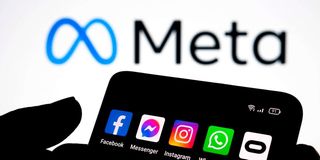
Content creators in Kenya will earn money from postings on Meta platforms Facebook and Instagram.
“I can tell you it doesn’t sound like it’s going to be easy to make money on that platform,” said digital content creator and HIV/Aids crusader Doreen Moraa, when asked by the Nation about making money on Meta-owned social media sites-Facebook and Instagram.
Ms Moraa was reacting to an announcement early this week by Meta’s President of Global Affairs Nick Clegg, that starting June, Kenyan content creators will begin monetising their content on Facebook and Instagram.
The news also left many wondering how different this would be from what some content creators are already making from Facebook and Instagram.

President of Global Affairs at Meta Sir Nicholas William Peter Clegg during an interview on Monday at Radisson Blu Aboretum Hotel in Nairobi.
“There will be in-stream Ads on Facebook, Ads in Reels so you can have them on either side of your reels, Instagram gifts and stars. The whole suite of monetisation tools used by creators the world over will be available in Kenya,” Mr Clegg announced in a meeting with President William Ruto at State House, Nairobi.
In an interview, Mr Clegg told the Nation that the eligibility process in Kenyan will open in two weeks.
“And a few weeks later within the next two or three months, creators will be able to use a whole range of tools to earn money directly from what they are doing online,” the former UK Deputy Prime Minister stated.
But for Ms Moraa and a host of Kenyan content creators, who spoke to the Nation over the announcement, the news should be welcomed with caution.
“It is good news because for the longest time, a lot of content creators from other countries have been enjoying monetisation. For instance, I have a friend in South Africa who gets paid directly by Meta (Facebook’s parent company),” Ms Moraa says.
However, she is sceptical about how easy it would be for one to directly cash-in from the planned Facebook monetisation programme.
“Yes it’s a good thing but the eligibility requirements are tough. Take for example the 60,000 minutes of views, for someone like me who creates content every day — with 131,000 followers, I am at 29,000 minutes. How long will it take someone with 5,000 followers who is also eligible?” Ms Moraa wonders.
She argues that the eligibility requirements are almost similar to those of YouTube.
“By the time I was getting to 4,000 minutes watch time on YouTube to be monetised for the first time, I had worked so hard. By the time I was receiving that first YouTube payment of Sh20,000, I was on my 50th video, a year and a half had elapsed. I was giving up. If at all these monetisation programme is all about bettering content creator as they say, then why make it hectic for them?”
To be eligible to earn from content via Facebook as announced by Mr Clegg, for the live videos, one will need to have a minimum of 10,000 followers, 600,000 total minutes viewed in the last 60 days with at least 60,000 minutes of the total 600,000 minutes viewed in live videos.
“This is next to impossible. Meta honestly needs to review those requirements for the creatives. We have micro content creators— those with 5,000 to 10,000 followers— but who do have content that is thoroughly engaging and have the interactions,” she says.
“Let’s face it, the probability of such a content creator attaining 60,000 minutes’ views just to earn, is very little. It would be reasonable to give them reasonable requirements which are regularly reviewed as they progress,” Ms Moraa adds.
Actor and content creator Martin Githinji says he will have to wait until the programme fully comes to effect to have a concrete position.
“I don’t know what to make of it now, it could be some random announcement made for political gains. The Facebook president said its coming by June, I would want to believe that. As of now we are not making money directly from either Facebook or Instagram, we only make money when brands collaborate with us,” he says.
He adds: “ But my understanding is that Instagram and Facebook want to be like YouTube. However, Instagram and Facebook are a bit complicated. Unlike YouTube where you go to watch videos, on the others you are mostly there to interact on a social level. And it’s from that social level interaction that some businesses are able to capture that interaction and use it to sell things.”
“On how it will work, it might not be as clear as YoutTbe. But still even in its clearness there is a catch, like when they talk about CPMs (Cost per Millie) where they give other countries high CPM than others. If you are to upload a video while in the States, it does better than when you upload one while in Kenya. So for Facebook and Instagram, we don’t know the mechanisms of how it’s going to work,” Mr Githinji says.
He however, appreciates the fact that the monetisation will open a new way for content creators to make money but is sceptical about the push by Kenyan politicians who are making it look easier than it really is.
Digital creator Brian Mutinda, doesn’t think he will be exploiting that avenue to make extra coins should it be rolled out.
“I know Meta is both Facebook and Instagram but there is a bit of biasness on Facebook which I am not keen on. I am only focused on Instagram, I don’t create content on Facebook,” Mr Mutinda says.
On how easy it’s been touted that it will be to cash in from the Facebook monetarisation programme even for the disinterested Mutinda, he doesn’t think it will be easy for those content creators who would opt for that avenue.
“Nothing comes easy, I have seen some split sheets from countries that have already been monetised and you will realise you will need to have a lot of views and I mean a lot of them to make something. It’s not like you collect 10,000 views and make Sh10,000 that’s not going to happen. But on the flip side, for those coming up, it will be a good avenue for them, especially for those content creators who don’t have brand deals,” Mr Mutinda says
Another issue that could be of concern is the mode Facebook will employ when disbursing the earned money.
He describes what he thinks is a “tedious” process by sites like YouTube, starting with receiving a Personal Identification Number physically to activating your account, before sharing bank details for money to be wired.
“I hope with Meta, the process can be simplified by paying through one’s PayPal account or M-Pesa,” says Ms Moraa.
Will the monetisation be the better option as touted and averagely what will one be expecting from the programme?
“It depends on how successful they are (content creators). It depends on how engaging their content is. We don’t run their business for them. I think the thing to remember about us is that we are a platform for others to build great businesses. We build the tool and people have to decide for themselves whether they use the tools or whether they don’t,” Mr Clegg said.











